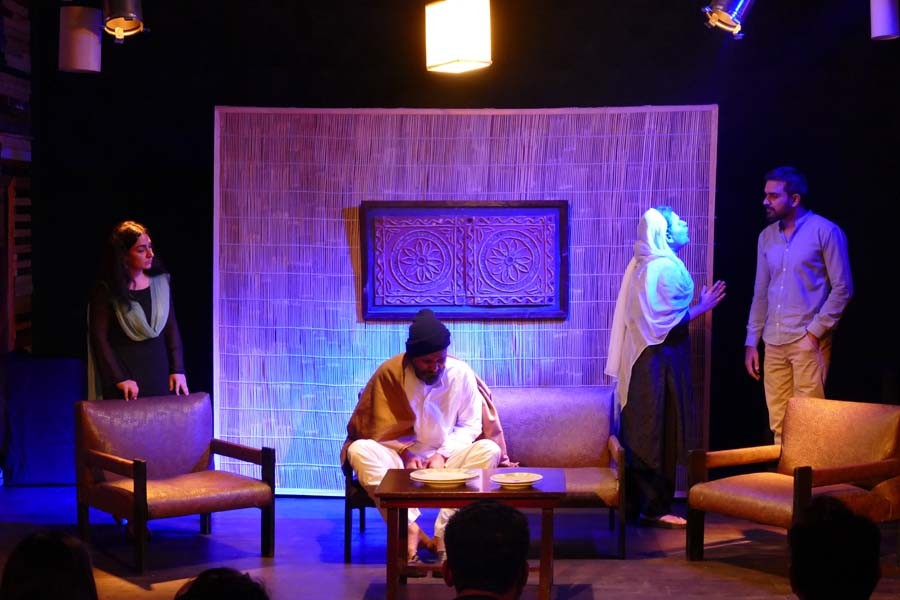
Grief, anger, and resignation all coalesce in Olomopolo’s new theatre play, Chup, which tackles the controversial issue of ‘missing persons’

‘Intense’ would be the best word to describe Chup, an Urdu play, performed recently at Olo Junction, which tackles the controversial issue of ‘missing persons’ in Pakistan head on.
Written by theatre artist Fawad Khan, and directed by Sunil Shanker, the play presents an intimate view of a society, and family, teetering on the edge. It thrives on juxtapositions where the silent caller is a sign of hope for recovery for the mother, yet represents an ominous reentry of the ‘abductor’ in their lives for the brother. Grief, anger, frustration, and resignation all coalesce to remind the audience of the multilayered nature of silence.
The play is driven by a breakdown of communication as well as a refusal to acknowledge the truth. Coupled with a lack of communication are the belligerent tones of multiple characters, each brought to breaking point by their frustration at being unable to shape their own lives. Caught in the web of circumstances beyond their control, they direct their anger at each other.
Tense and terse in equal parts, it is the relationship between Bakhtawar Mazhar’s portrayal of the mother and the short-tempered son Salman, played by the writer himself, upon which hinges the balance of the characters’ sanity. The father’s character, enacted by director Sunil Shanker, is the first to manifest the unbearable weight of the tragic limbo imposed on his family through the disappearance of his younger son, Saad.
Kaif Ghaznavi’s Rabia is like an automaton, the lack of expression portraying her suspended existence as the wife of a man whose whereabouts have been unknown for three years. Zara, played by Haya Fatima, is the school-going child who has the least amount of stage-time. Ironically, it’s a concern for her safety that dictates the direction of the family’s involvement in the protest movement and ultimately ruptures the family’s fragile bonds.
Pity is often the dominant response to a mother’s grief for her ‘disappeared’ child, a scene broadcast on our television screens with alarming regularity. Mazhar’s character turns that perception on its head, invoking admiration for her evolution from a woman bearing her grief silently to a woman who is willing to take on the odds to recover her missing son. But the first hurdle in her quest to demand answers from the custodians of the state turns out to be the son living with her.
This schism between the parents and son might appear an interesting deviation from traditional family dynamics to an outsider but the insidious fear and threat to the safety of loved ones as repercussions for voicing dissent is, unfortunately, an emotion many in Pakistan are familiar with.
At the end of the day, the mother’s fierce resolve pales in the face of impending threats to the safety of her grandchild, leaving the silent audience with more questions about the rising number of disappearances of social activists, bloggers, and journalists in the country.
The menacing threat of the invisible abductors, referred to as a powerful ‘organisation’ in the play, is laced throughout the narrative. Like Saad the Missing, the abductors are the central characters of the play, both unseen entities whose existence dominates and overwhelms the reality of life for Saad’s family. The audience never learns who the culprits are, even the thought of naming them within the privacy of their home being too risky for the proponents. The theme of self-preservation runs through the play like an undercurrent, pitting one mother’s distress for her child against her son’s constant worry about the same fate befalling his own daughter.
It does not come as a surprise that one of the main characters considers NGOs and civil rights activists as self-serving opportunists who feed off peoples’ misery. It is after all, the misperception fed to the general public through mass media to maintain status quo on matters of civil importance. The silence on the rough treatment meted out to social workers, whether they are polio workers or the late Asma Jahangir, is commented on through the information that Saad is fighting for the rights of labourers.
In the end, the "chup" highlighted in the play becomes a reference to the multiple ways in which collective silence on the injustice of ‘forced disappearances’ has been internalised and continues to muffle attempts at recovery.
Olomopolo Media has never shied away from hosting performances that shine the light on our society’s failure to raise a collective voice against injustices. The small hall at Olo Junction provided the perfect setting for the realistic portrayal of a dysfunctional family. The absence of a raised stage brought the performers and the audience to the same level, an arrangement that heightened the impact of conflicting interests and emotions expressed in the play.
Chup begins and ends with silence, a silence that is replete with fear of the powerful and the reluctant resignation of the affected families. Some register their disquiet through protest marches and the slightly more independent social media, but the issue of forced disappearances continues to be shrouded in silence.
Pulitzer Prize-winning playwright Edward Albee once said that a playwright’s "responsibility is to the public consciousness, not the public view of itself." With Chup, Fawad Khan and Sunil Shanker have initiated a discussion to shake the public consciousness out of its complacency.